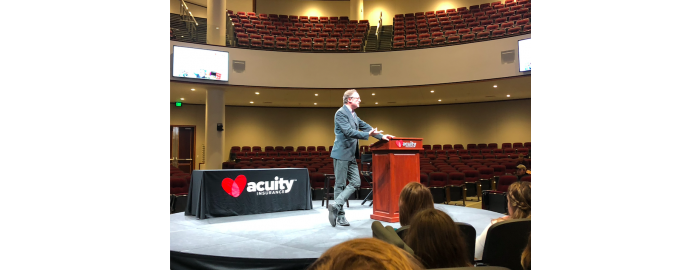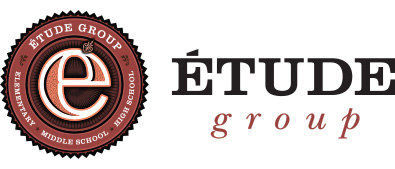
Students from Étude Middle and High School participated in the Literally Acuity event that brought renowned young adult author M.T. Anderson to Sheboygan. High school students read his book Feed, a futuristic warning of the ways advertising and internet access can negatively impact societal development. Middle school students read The Astonishing Life of Octavian Nothing, a novel about social experiments conducted in Revolutionary Boston.
Just as Étude students start their study of Feed with a discussion of language—specifically how language can be used and manipulated to symbolize the rebellious teenage years—Anderson also began his presentation with an audience discussion of the evolution of slang in young America. Our students offered up such terms as chill, lit, cool, fire, and fleek as evidence of the way they use manipulated language to celebrate life. Anderson explained his use of this evolution of linguistics in his novel by creating futuristic slang, such as meg, unit, and youch to express how the characters in this new world are actually quite similar to both current and past generations of young adults. Alexander Burg, Étude senior remarked, “The slang he created in Feed sounded and felt realistic, like it is truly what our current slang is evolving into because of technology.”
This discussion on linguistic evolution also exposed the different types research Anderson embarks upon before and during the writing process. Miguel Guevara, Étude senior commented “I felt he was open-minded enough to take from several perspectives. He didn’t just write about his own life. He wrote about perspectives that he had to research.” Specifically, Anderson said he would immerse himself in the advertising found in magazines such as Seventeen, Vogue, and Maxim to place himself in the right headspace to write Feed.
Anderson also led an interactive demonstration of why writer’s block occurs during the writing process. He said that he believes writer’s block primarily occurs because the “ground situation” or life presented within the context of the writing is simply too good, too easy, too utopian. A situation must arise to destabilize the story and “produce the energy to move it forward” (Anderson). To demonstrate this point, he had our students develop a story using a ping-pong technique, building the story off of information presented by the previous student’s response.
Here is the story that developed. Anderson called it a “Jane Austen-esque story with starch.”
The Ground Situation: There was a potato that went to the gym every day because he liked a cute little French fry there.
Destabilization: Potato blight reached the potato and a black mold began to spread throughout the entirety of his skin.
First Attempt to Resolve: This potato was required to cover his skin with a medical mayonnaise.
Second Attempt to Resolve: The medical personnel also directed the potato to jump into an active deep fryer. This, however, ended up being an example of why writer’s block might occur. He explained to our students that this scenario would certainly result in the demise of the potato; thus, leaving the reader unsatisfied and confused by the rationale of the resolution attempt and leaving the writer with little to no inspiration for finishing the story.
Third Attempt to Resolve: After the mayonnaise lotion, the potato meets a much older, much wiser potato that instructs him to find a human with a solution to the potato blight. This ultimately sets the potato on a journey.
Resolution: The mold-infected potato finds a human who can help him! The human sheds the molded potato’s skin and turns him into a French fry. He is reunited, in his new French fry form, with the sweet little fry from the gym.
Ultimately, a story of love and endurance developed by Étude students.
Camille Staats is one of the students that studied Feed at Étude High School: “It was cool to see the author of a book I read and understand him as a human being and not just the voice for this book.” Anderson concluded his presentation with a Q&A session during which our students discovered:
-
He regrets some of the names in Octavian Nothing because he no longer believes those names symbolize the characters.
-
He wishes he would have understood the future of social media and the way people are currently using it to promote themselves. It would have added a really fascinating dimension to Feed.
-
There are several nods to other pieces of literature in Feed, including a reference to the societal expectations of citizens in George Orwell’s 1984, and the floating islands in Gulliver’s Travels by Jonathan Swift.
-
He values the ways young adult literature is a safe space for young readers to explore the realities of the world, even the unpleasant ones. Writing, language, messages should not be “dumbed” down for them within novels—they should be challenged.
Étude sixth-grader and reader of Octavian Nothing, Keyanna Martinez reflected upon today’s activities: “I value the advice he gave to young writers. Like how he said for swimming you slowly wade in the waters, but with writing, you should just jump in. You should find a genre you like and just start writing and write a lot.”
Opportunities for our students to learn beyond the brick and mortar of the classroom, to hear professionals like M.T. Anderson engage in conversations about his work, and to discuss societal ideas in multi-leveled age groups is what sets Étude apart from other schools. Our students are immersed in learning experiences that transcend the time and space of the academic school year, providing them with the skills necessary to “jump right in” whatever learning comes next.

